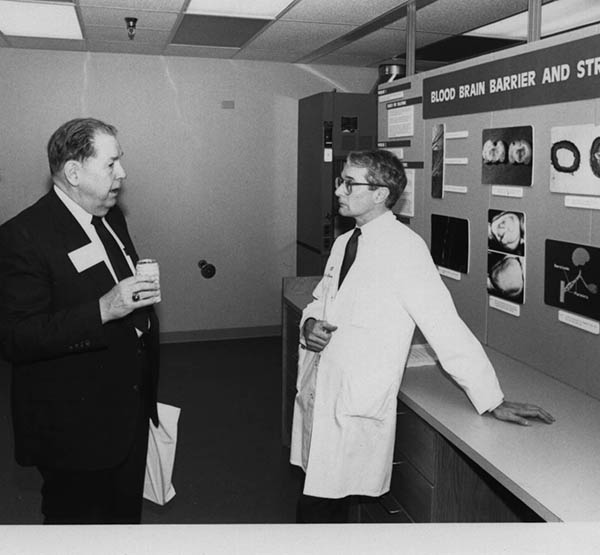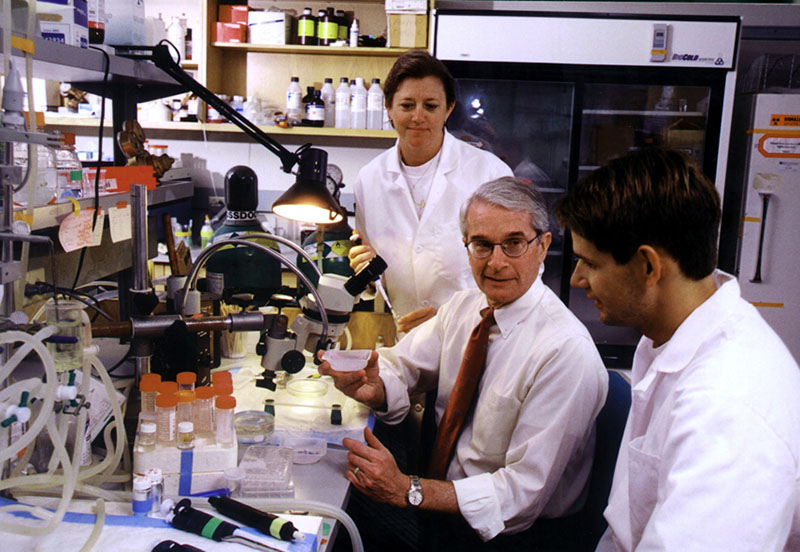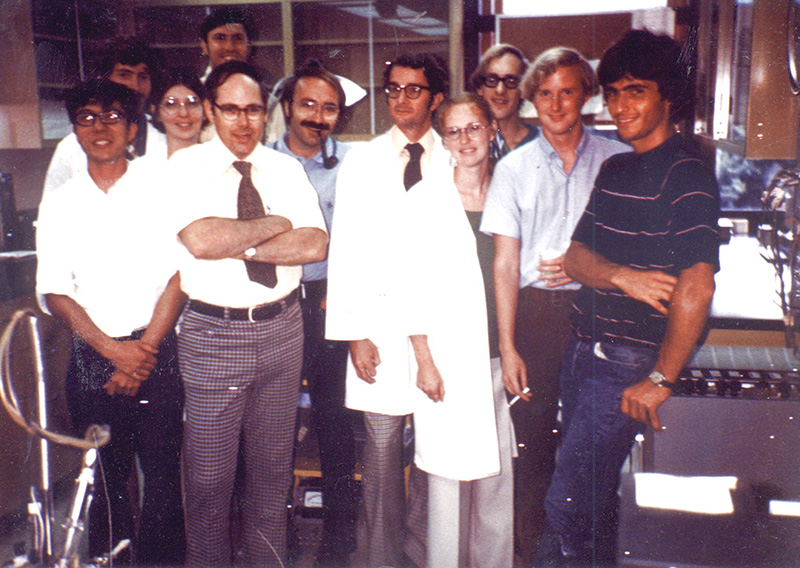From his first day as a cardiovascular fellow at the University of Iowa, Donald Heistad, MD, now a professor in the Division of Cardiovascular Medicine, hit the ground running, immersing himself in the research community and absorbing the opportunities Iowa offered him. Over the next 40 years as a faculty member, he used those lessons learned in his early days to aid his own mentees and helped establish the strong reputation of Iowa as the epicenter of cardiovascular research.
To thank him for his years of mentorship, ground-breaking research, and dedication to the University of Iowa, Heistad will be awarded the Daryl and Nancy Granner Carver College of Medicine’s Distinguished Mentor Award. The DMA honors one exemplary mentor in the college each year who has guided their mentees toward laudatory careers of their own.
 “Direct, individualized instruction and guidance can be difficult to get just right by most faculty, especially in the face of competing priorities,” E. Dale Abel, MD, PhD, chair and DEO of the Department of Internal Medicine, wrote in his nomination letter for Heistad. “This is what makes exemplary mentoring all the more special, and when one examines the many heartfelt and laudatory letters and attestations, one appreciates the enormous extent and impact of Dr. Heistad’s mentoring on trainees, junior faculty, and even senior faculty.”
“Direct, individualized instruction and guidance can be difficult to get just right by most faculty, especially in the face of competing priorities,” E. Dale Abel, MD, PhD, chair and DEO of the Department of Internal Medicine, wrote in his nomination letter for Heistad. “This is what makes exemplary mentoring all the more special, and when one examines the many heartfelt and laudatory letters and attestations, one appreciates the enormous extent and impact of Dr. Heistad’s mentoring on trainees, junior faculty, and even senior faculty.”
The accompanying letters of support cite Heistad’s ability to see the promise in every one of the students and junior faculty he mentors. Although Heistad has always been committed to finding answers supporting them through every step of their education and guiding them toward careers, he also considers the personal life and wellbeing of each of his mentees, even regularly inviting their families into his home for dinner.
That influence extends well past Heistad’s students’ time with him. “He has not just influenced the lives and careers of those scientists he directly teaches and mentors, but those they train as well,” Abel said. “The impact he continues to create in the larger scientific community will remain both immeasurable and persistent for decades to come.
James Y. Choi, MD, Carver College of Medicine Assistant Dean of Student Affairs and Curriculum, met Heistad in 1986. Choi became a lab assistant after an unanimous amount of peers recommended Choi join Heistad’s lab. Throughout his years as a physician and a teacher, Choi still thinks of Heistad’s guidance and respect as a teacher.
“When I became a staff physician at the University of Iowa, I found myself reaching back to the lessons I learned from Dr. Heistad,” Choi wrote in his letter of support. “My way of paying an ultimate compliment to Dr. Heistad is to imitate him and mentor others like he mentored me.”
 David G. Harrison, MD, the Betty and Jack Bailey Professor of Medicine and Pharmacology at Vanderbilt University, completed his cardiology fellowship at the University of Iowa in 1980 and crossed paths with Heistad almost immediately. Shortly after Harrison’s arrival, he wrote, Heistad taught Harrison about mediators that could cause different responses in people with elevated cholesterol. Harrison would later use this knowledge to investigate and prove that lower cholesterol normalized endothelial function.
David G. Harrison, MD, the Betty and Jack Bailey Professor of Medicine and Pharmacology at Vanderbilt University, completed his cardiology fellowship at the University of Iowa in 1980 and crossed paths with Heistad almost immediately. Shortly after Harrison’s arrival, he wrote, Heistad taught Harrison about mediators that could cause different responses in people with elevated cholesterol. Harrison would later use this knowledge to investigate and prove that lower cholesterol normalized endothelial function.
“The idea that the endothelium is a target of disease is now widely accepted, and physicians commonly use therapeutic interventions like statins, aspirin and ACE inhibitors to improve endothelial function, but our experiments were among the first to establish this,” Harrison wrote. “I feel very fortunate that Dr. Heistad included me in this early work and was so supportive in guiding my early career development.”
Steven Lentz, MD, PhD, Hematology Section Chief in the Division of Hematology, Oncology and Blood & Marrow Transplantation, remembers arriving on campus in 1992 and immediately feeling welcomed by Heistad, who served as one of his first and most important mentors during his training.
“Don’s mentorship led me to develop new directions for my nascent research program, moving beyond biochemical and cell culture studies toward the use of animal models to examine pathophysiological relevance,” Lentz wrote in his letter of support. “This work, which was performed under Don’s direct mentorship, really put me on the map as an investigator and ended up driving my academic career for the next two decades.”
 Heistad became a supportive and generous role model to Lentz, a common theme among many of the letters written in support of Heistad’s DMA nomination. Heistad offered Lentz several opportunities including a position as an associate editor for Arteriosclerosis, Thrombosis and Vascular Biology. Lentz credits this experience and Heistad for several of the other opportunities he’s received as an investigator and educator.
Heistad became a supportive and generous role model to Lentz, a common theme among many of the letters written in support of Heistad’s DMA nomination. Heistad offered Lentz several opportunities including a position as an associate editor for Arteriosclerosis, Thrombosis and Vascular Biology. Lentz credits this experience and Heistad for several of the other opportunities he’s received as an investigator and educator.
“I learned many important things from Don: how to design research studies, how to write papers and grant applications in a clear, concise and influential fashion, how to organize research teams, how to interface with the NIH, and, most importantly, how to become a successful and supportive mentor for my own trainees and colleagues,” Lentz wrote.
The award will be presented to Heistad on Friday, September 25, at 9:00 AM* in the Prem Sahai Auditorium. David J. Skorton, MD, president and CEO of the Association of American Medical Colleges, and former colleague of Heistad’s in the Division of Cardiovascular Medicine, will deliver the Distinguished Mentor’s Lecture.
UPDATE: The award presentation has been postponed until Tuesday, October 12, 2021 at 3 pm.